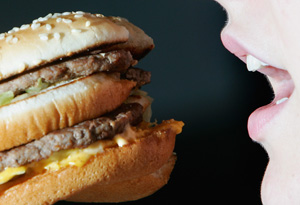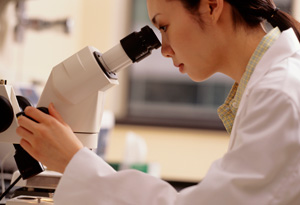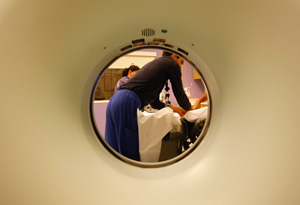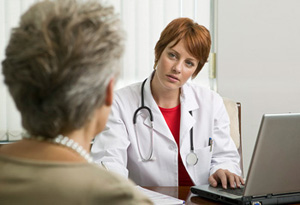Women's Health Roundup—May 2010

How is a cheeseburger like heroin? Are mammograms and CT scans actually causing cancer? Should breast cancer survivors avoid soy food—or eat more of it? Find out how the latest developments in medical science will change your life.
Women and "White Foods"The mantra "no white foods"—white rice, bread made with white flour, and ice cream—has been a guideline of weight-loss advocates for years. They usually pair that with the advice to "eat 100 percent whole grains."
Now, a study by Italian scientists published in the Archives of Internal Medicine says skipping white foods has another crucial health benefit for women—reducing risk of heart disease.
Foods made with highly processed white flour have been stripped of fiber and other nutrients, while the less-processed whole grain foods retain those fiber and nutrients. White foods and 100 percent whole grains both contain carbohydrates, but the white foods have high-glycemic index carbohydrates. That spongy loaf of white bread is not all that different, nutritionally, from a candy bar.
The study found that just eating more carbs doesn't increase heart health risks. Instead, it is the type of carbohydrates eaten—whether high or low on the glycemic index—that is strongly linked to risk of heart disease in women.

Fast Food Is Like a Drug
Why is it so hard to give up cheeseburgers and french fries? According to researchers at the Scripps Research Institute in Florida, it could be because junk food addiction is actually similar to addiction to drugs like heroin and cocaine.
The researchers found that lab rats, when given the chance to eat an unlimited supply of salty, sugary and fatty foods, gained more weight than those who did not have an unlimited supply of junk food. When the researchers took away those rats' access to junk food—instead, giving them more nutritious foods—the rats simply refused to eat for up to two weeks. And after they became obese, the rats had diminished pleasure sensors in their brains, causing them to eat even more junk food.
This change in brain chemistry and behavior from overeating of junk food mimics that of drugs.
Why is it so hard to give up cheeseburgers and french fries? According to researchers at the Scripps Research Institute in Florida, it could be because junk food addiction is actually similar to addiction to drugs like heroin and cocaine.
The researchers found that lab rats, when given the chance to eat an unlimited supply of salty, sugary and fatty foods, gained more weight than those who did not have an unlimited supply of junk food. When the researchers took away those rats' access to junk food—instead, giving them more nutritious foods—the rats simply refused to eat for up to two weeks. And after they became obese, the rats had diminished pleasure sensors in their brains, causing them to eat even more junk food.
This change in brain chemistry and behavior from overeating of junk food mimics that of drugs.

Patently Unfair
In what supporters call an advance for women's health, a federal judge invalidated two patents on isolated human genes linked to ovarian and breast cancer.
The judge ruled that genes are not patentable. He cited existing laws that prevent companies from getting a patent on something that occurs naturally. If genes were allowed to be patented, patients who feared they have the cancer-causing gene could be diagnosed only by the patent-holding company.
The fight is far from over—the ruling is widely expected to be appealed.
In what supporters call an advance for women's health, a federal judge invalidated two patents on isolated human genes linked to ovarian and breast cancer.
The judge ruled that genes are not patentable. He cited existing laws that prevent companies from getting a patent on something that occurs naturally. If genes were allowed to be patented, patients who feared they have the cancer-causing gene could be diagnosed only by the patent-holding company.
The fight is far from over—the ruling is widely expected to be appealed.

Diagnosing a Problem
In a little more than a decade, use of CT scans in the United States has gone from rare to common. Approximately 70 million CT scans were administered in 2007. However, according to the Annals of Internal Medicine, this useful tool could actually be causing an increased risk of cancer.
A study found that giving a 40-year-old just one heart CT scan—which, like an X-ray, uses a dose of radiation to see inside the body—would result in cancer in 1 in 270 women and 1 in 600 men. A different study estimates that 29,000 future cancers will have been related to radiation exposure from CT scans given in 2007.
One problem with CT scans could be lack of standardization in equipment, with some CT scans giving off more radiation than is necessary.
In a little more than a decade, use of CT scans in the United States has gone from rare to common. Approximately 70 million CT scans were administered in 2007. However, according to the Annals of Internal Medicine, this useful tool could actually be causing an increased risk of cancer.
A study found that giving a 40-year-old just one heart CT scan—which, like an X-ray, uses a dose of radiation to see inside the body—would result in cancer in 1 in 270 women and 1 in 600 men. A different study estimates that 29,000 future cancers will have been related to radiation exposure from CT scans given in 2007.
One problem with CT scans could be lack of standardization in equipment, with some CT scans giving off more radiation than is necessary.

More Mammogram Risks?
Women who are most at risk for developing breast cancer—either because of genetic mutation or family history—may also be the most likely to suffer negative consequences from increased exposure to radiation, such as in the form of yearly mammograms.
In analysis of previous studies, researchers in the Netherlands found a statistically significant elevated risk for breast cancer in at-risk women who had been exposed to radiation before age 20, or who had been exposed to radiation five or more times.
The American Cancer Society maintains that, while any radiation poses risks, the advantages in early detection outweigh the dangers.
Women who are most at risk for developing breast cancer—either because of genetic mutation or family history—may also be the most likely to suffer negative consequences from increased exposure to radiation, such as in the form of yearly mammograms.
In analysis of previous studies, researchers in the Netherlands found a statistically significant elevated risk for breast cancer in at-risk women who had been exposed to radiation before age 20, or who had been exposed to radiation five or more times.
The American Cancer Society maintains that, while any radiation poses risks, the advantages in early detection outweigh the dangers.

Soy and Breast Cancer Confusion
Past studies have raised questions about isoflavones—the antioxidants found in soy foods—working as a stimulant in the regrowth of cancer cells in breast cancer survivors. However, a study of breast cancer survivors in Shanghai suggests that those who ate the most soy had a decreased risk of breast cancer returning.
An editorial that accompanied the study, published in the Journal of the American Medical Association, cautioned that the findings relate only to women who ate soy foods—and should not be extrapolated to promote soy supplements.
Keep Reading:
11 tips for anyone facing chemotherapy
Dr. Oz talks to a proponent of bioidentical hormone replacement therapy
Stay well with Oprah.com's best women's health advice
Past studies have raised questions about isoflavones—the antioxidants found in soy foods—working as a stimulant in the regrowth of cancer cells in breast cancer survivors. However, a study of breast cancer survivors in Shanghai suggests that those who ate the most soy had a decreased risk of breast cancer returning.
An editorial that accompanied the study, published in the Journal of the American Medical Association, cautioned that the findings relate only to women who ate soy foods—and should not be extrapolated to promote soy supplements.
Keep Reading:
11 tips for anyone facing chemotherapy
Dr. Oz talks to a proponent of bioidentical hormone replacement therapy
Stay well with Oprah.com's best women's health advice
As a reminder, always consult your doctor for medical advice and treatment before starting any program.



